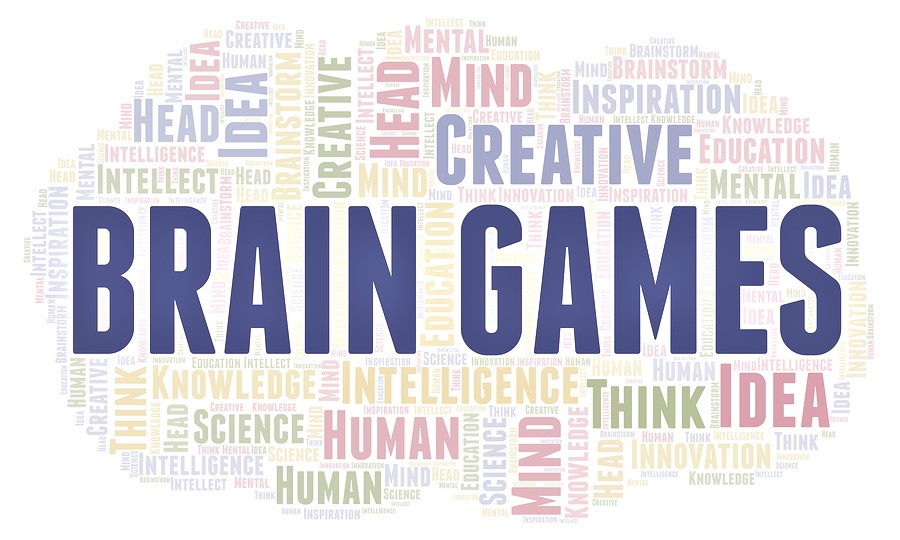There are a number of so-called “brain game” products on the market these days. These typically are computer or smartphone/tablet-based games that claim they can help improve seniors’ cognitive function and memory. But do they really work? Could playing video games be the secret to decreasing the prevalence of neuro-degenerative conditions like dementia? And what about things like crossword puzzles and sudoku—can they help seniors stay mentally sharp?
Aging and brain function
It is a normal part of the aging process to experience some decline in the number of neural synapses within the brain, which are imperative to memory and cognitive function. There are also conditions like dementia (including Alzheimer’s disease) or Parkinson’s disease that cause more severe and debilitating cognitive decline among older people.
Some of the causes behind cognitive decline may be preventable by making lifestyle changes like managing weight, staying physically active, quitting smoking, limiting alcohol intake, and managing stress. Keeping the mind active—pursuing continuing education opportunities, or learning a new skill, a new language, or how to play an instrument—may even aid with the formation of new neural networks in seniors’ brains.
>> Related: Firsthand Advice on Caring for Someone with Alzheimer’s
Inconclusive studies
You’ve heard the saying “use it, or lose it”; this axiom may be applicable to the brain.
The 1995 MacArthur Study, one of largest longitudinal studies of the aging process, found that among the octogenarians in their study sample, those who were more physically and mentally active—frequently doing activities like crossword puzzles, reading, and playing bridge—also had the highest cognitive abilities. However, a study conducted by neuroscientists at University of Pennsylvania and Drexel University found no significant difference between the memory function of seniors who played “brain games” and the control group that didn’t play the games.
Still another recent study found that it’s not enough just to use your brain; you have to challenge it by learning something unfamiliar.
University of Texas at Dallas researchers randomly assigned 221 adults, ages 60 to 90, to participate in a particular type of activity for 15 hours a week for a three-month period. Some were assigned to learn a new skill — digital photography, quilting, or both. Others were told to engage in more commonplace activities at home, like listening to classical music and doing crossword puzzles. And some seniors were assigned to a group that focused on social interactions, field trips, and entertainment.
At the end of the study, the researchers discovered that the seniors who were in the group that learned new skills showed quantifiable improvements in memory, as compared to those who engaged in the non-demanding mental activities at home or the purely social group.
So, while the research is thus far inconclusive on this topic, it appears that the most beneficial mental stimulation may involve learning new information or skills, rather than just recalling what we already know.
And this stands to reason. Think of the brain as being like a computer. Learning something new—like a new language or skill—stimulates the brain and helps form new neural pathways. It’s sort of like adding new software or a new hard drive to a computer, increasing its functional and memory capacity. By comparison, activities like trivia or crossword puzzles simply require you call upon data that already exists in the computer that is your brain.
>> Related: 4 Ways CCRCs Help Seniors Stay Healthy
Gaming for the senior set
Video and computer games are getting increasingly popular among seniors. Entertainment Software Association research from 2018 found that a quarter of people over the age of 50 play video games on a regular basis—a number that is trending upward.
If you’re a senior who is interested in diving into the gaming world with the goal of improving your brain health, again, games that teach new information—versus recalling data you already know—are believed to be best. However, there are also many fun games that get your body moving, offering the added benefit of improving your physical fitness, balance, and cardiovascular health (which is also good for your brain!).
Computer games and apps for smartphones/tablets
There are more and more computer-based games, as well as apps that can be downloaded to a smartphone or tablet (such as an iPad), that have educational value, which may be beneficial for seniors’ brains.
For example, programs like Rosetta Stone, and games such as Lingo Arcade, Influent, and MindSnacks can help you learn a new language, and Rocksmith can teach you how to play the guitar. If you’re interested in learning how to do computer programming, CodeMonkey will educate you on the basics of coding languages like HTML5 and JavaScript.
History buffs may enjoy games like Crusader King or Civilization VI, which combine strategic thinking with history lessons. There are even flight simulator games that can teach you how to fly an airplane!
>> Related: Lifelong Learning: Good for Seniors’ Minds & Bodies
Gaming consoles
There are numerous options when it comes to gaming consoles, from Xbox to PlayStation to Nintendo. Many of the games for these systems provide purely entertainment value, and there’s nothing wrong with that! But there are also several games that are effective at getting your body moving while you have fun. As an added benefit, these gaming systems are enjoyable for people of all ages and can be a great activity for grandparents to share with their grandchildren.
You may have heard of a Wii (pronounced like “we”). It is an interactive gaming console sold by Nintendo, and it’s become all the rage in many senior living communities. The Wii Fit system bundle comes with a balance board “peripheral” (add-on equipment) that is used in many Wii games to track your movements, allowing the game to make more personalized recommendations.
Wii Fit can be used for activities like yoga, balance games, and aerobic and strength training exercises. The Wii Sports Resort game offers numerous virtual activities that can get seniors moving like golf, tennis, and bowling.
Virtual reality
The lines are increasingly getting blurred between gaming and virtual reality (VR). VR is where a user dons headphones and a special mask that displays various simulations of three-dimensional images that can be interacted with by the user in a seemingly real way.
Such VR technology is another high-tech tool that is being used in several new applications for seniors. There are VR uses for memory care patients, with programs designed to stimulate the brain, spur memories, or encourage anxiety reduction. There are also physical therapy and pain management applications for VR.
>> Related: Understanding Memory Loss & Memory Care Communities
The future of gaming in senior living communities
As I visit continuing care retirement communities (CCRCs, or life plan communities) across the country, I’m witnessing first-hand the popularity of gaming among seniors. Based on this growing trend, gaming may play a bigger role in the future of the CCRC industry.
I can even foresee a time when CCRCs might create on-site gaming centers where residents can enjoy some friendly competition with each other. Whether it’s innovative uses for Wii Fit exercise groups or a fierce Crusader King virtual battle, CCRC residents can benefit from the physical activity and/or mental stimulation offered by these games in a fun and social atmosphere (interpersonal interactions which offer their own health benefits for the seniors).
But the bottom line is that, based on current research, the types of games that are believed to be most beneficial for seniors’ cognitive health are those that involve educational elements. So instead of a word puzzle, sudoku, or fantasy-adventure game, chose one that will help you learn Italian, take up the virtual guitar, or try your hand at computer programming.
And also don’t underestimate the “old-fashioned” way of learning: from a book or in a classroom-type setting. Most CCRCs provide residents with opportunities for this type of continuing education on an array of topics. Some even have lifelong learning partnerships with nearby universities, allowing residents to audit college courses. It might not be as snazzy as the latest computer or video game, but this type of learning still offers seniors potential benefits to their brains.

FREE Detailed Profile Reports on CCRCs/Life Plan Communities
Search Communities






